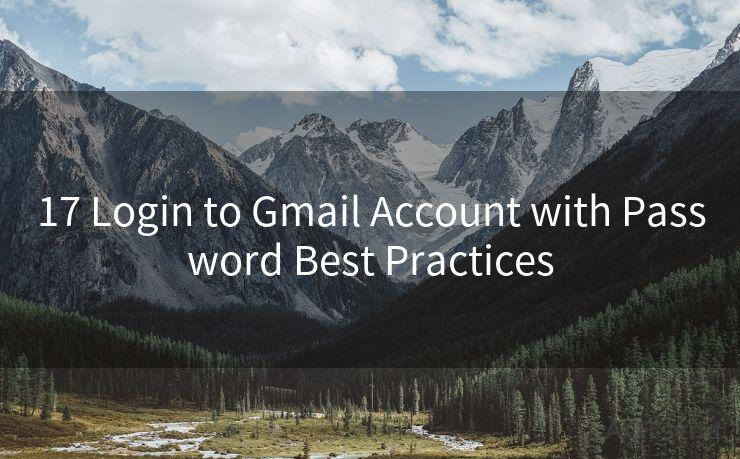17 Login to Gmail Account with Password Best Practices




1. Introduction
In today's digital age, Gmail has become an essential tool for communication. However, with the increasing number of cyber threats, it's crucial to follow best practices when logging into your Gmail account. This article outlines 17 key practices to ensure secure access to your Gmail, focusing on password management and login procedures.
2. Use a Strong and Unique Password
Creating a strong and unique password is the first step towards securing your Gmail account. Avoid using easily guessable information like your name, birthdate, or common words. Instead, opt for a combination of uppercase letters, lowercase letters, numbers, and special characters.
3. Don't Reuse Passwords
Never use the same password for multiple accounts. If one account is compromised, all your other accounts using the same password are at risk.
4. Enable Two-Factor Authentication
Two-factor authentication adds another layer of security to your Gmail account. Even if someone knows your password, they'll still need a second verification method, like a code sent to your phone, to access your account.
5. Update Your Password Regularly
Regularly updating your password reduces the risk of it being compromised. Set a reminder to change your password every few months.
6. Avoid Public Computers for Logging In
Public computers might have keyloggers or other malicious software that can capture your login credentials. Use your personal device whenever possible.
7. Beware of Phishing Scams
Never click on links in emails asking you to verify your account details. These are often phishing scams designed to steal your login information. Always go directly to the Gmail login page.
8. Use a Password Manager

Password managers help you create and store complex passwords securely. This way, you don't have to remember each password, reducing the temptation to use simple or repeated passwords.
9. Clear Your Browser's Cookies and Cache Regularly
Clearing your browser's cookies and cache can help reduce the risk of someone stealing your login information through these stored data.
10. Log Out When Finished
Always log out of your Gmail account when you're not using it, especially if you're on a shared or public computer.
11. Be Cautious of Extensions and Plugins
Some browser extensions and plugins might pose a security risk. Only install trusted extensions and keep them updated.
12. Monitor Your Account Activity
Regularly check your Gmail account's activity log to monitor any unusual or unauthorized access attempts.
13. Keep Your Recovery Information Updated
Ensure your recovery email and phone number are up to date. This helps in case you forget your password or your account is compromised.
14. Avoid Logging In Through Unsecure Networks
Unsecure public Wi-Fi networks can expose your login credentials. Use a VPN or wait until you're on a secure network to access your Gmail.
15. Educate Yourself on the Latest Security Threats
Stay informed about the latest cybersecurity threats and how to protect yourself from them.
16. Consider Using an Alternative Email Provider for Less Sensitive Information
For non-critical emails, consider using a separate email account to reduce the risk of exposing your primary Gmail account.
17. Report Suspicious Activity Immediately
🔔🔔🔔
【AOTsend Email API】:AOTsend is a Managed Email Service for sending transactional emails. Support Email Types: reminders, authentication, confirmations, notifications, verification codes, invoices, password resets, account activations, billing statements, two-factor authentication (2FA), and one-time passwords (OTP) emails, etc. $0.28 per 1000 Emails. 99% Delivery, 98% Inbox Rate.
You might be interested in:
Why did we start the AOTsend project, Brand Story?
What is a Managed Email API, How it Works?
Best 25+ Email Marketing Platforms (Authority,Keywords&Traffic Comparison)
Best 24+ Email Marketing Service (Price, Pros&Cons Comparison)
Email APIs vs SMTP: How they Works, Any Difference?
If you notice any suspicious activity on your account, report it to Google immediately.
By following these best practices, you can significantly enhance the security of your Gmail account and protect your sensitive information from falling into the wrong hands. Remember, prevention is always better than cure, so stay vigilant and keep your digital life secure.




Scan the QR code to access on your mobile device.
Copyright notice: This article is published by AotSend. Reproduction requires attribution.
Article Link:https://www.mailwot.com/p5764.html



